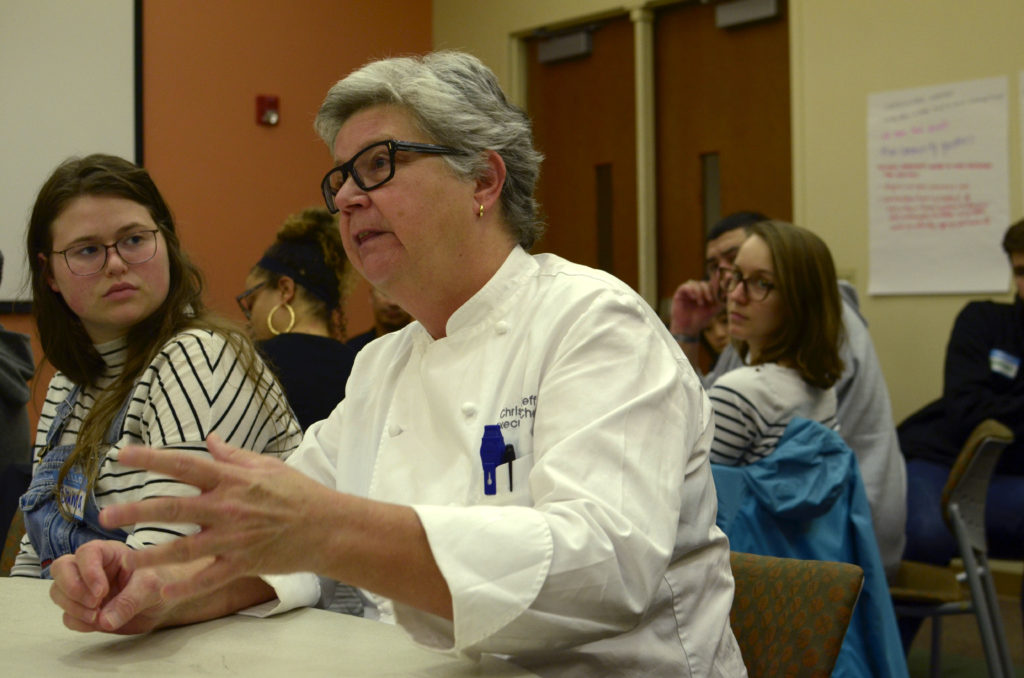The Department of Anthropology, Sociology and Social Work (ASSW) started their year-long series of Social Justice Teach-Ins with their event on Tuesday called “Working Towards Food Justice.”
Zoe Sexton, one of the student organizers for the opening event, said that the department decided to host these teach-ins in response to the current government administration and a desire to take action.
“Rather than be paralyzed by grief, fear or anger we can respond in a way that gives the community of students, professors and professionals the platform to come together and have equal voice,” she said.

Executive Chef of Bon Appetite Christine Keff explains Seattle U’s practices in shopping for sustainable sea food.
One of the primary objectives of the ASSW organizers was to ensure that they approached the needs of their community by reaching out and giving people who make up that community a platform to articulate their needs.
“The paradigm is different,” Sexton said. “We are not having professors teaching, we are having a collection of academia and those marginalized being able to create solutions together, inform one another, inspire one another and understand how to best respond to injustice.”
To spark conversations about the night’s topic, poster papers were hung around the room, prompting the attendees with the question, “What does food justice mean to you?” Students and faculty made their way around the room filling up each paper with notes like “purchase responsibly” and “everyone has access to healthy food.”
Guest speaker Veronica Fincher from City of Seattle Waste Reduction, said that food justice is important because it impacts health and the environment. When resources are wasted and food is thrown away, it creates more waste and pollution and increases the amount of greenhouse gases.
The teach-in was structured as a sequence of small group discussions. Each table formed a small group and was led through a different topic about food justice by guest speakers. These speakers included Fincher, Laura Titzer from Northwest Harvest and Kia Torres, a community member who provided insight on food insecurity.
Torres has been able to combat the food injustices she has faced in her own life by being proactive and figuring out ways to create meals for herself that are not only healthy and sustainable, but also budget friendly. She has learned to grow her own organic vegetables within the comfort of her home.
“I learned on the internet,” Torres said, “Some dude named Bob taught me how to grow garlic in the windowsill. I can grow enough sprouts for a romaine salad in about four days, but I would not have known if I had not done it.”
Torres’s work in her community expanded from actions she took in her own life when she was hungry and did not have any money. Currently, she uses her skills to build connections between stores and people with excess food to homeless shelters, to teach the homeless how to store food and to ensure that the resource guides distributed to homeless are up to date.
Something that Torres encouraged in her group discussion was community-based living. She emphasized that this lifestyle can be as simple as talking to neighbors, getting to know their needs, articulating your own and being able to work together to meet those collective needs.
Right now, Sexton strives toward a community-based lifestyle through her food exchanges and purchase coordination with her neighbors. She and her neighbors have created a community that shares with each other.
“If I know my neighbor is sick, I can take $1 worth of resources and create him a little custom [soup],” Sexton said. “I know he is going to eat something that is not only going to feed his body, but it is going to feed his spirit by someone bringing him something custom made.”
Sophomore Social Work major Emma Roke said that she felt encouraged to continue to integrate food justice into her everyday life through the simplicity and communal aspect of Torres’s food journey. Roke plans on applying her new knowledge about food injustices to her own life by living out her meaning of food justice.
“Food justice means that everyone has access to healthy food that is procured and grown in a humane way,” she said. “There should be kindness in our food production and kindness in the way we give food so that everyone has an equal chance to put what they need in their bodies.”
Roke also plans on attending the four remaining Social Justice Teach-Ins for the school year which include “Student Advocacy and Activism” and “Welfare and Economic Inequality.”
“All the topics that [the department of ASSW] picked are topics that are not talked about enough,” she said. “Sometimes we think that we know something about a topic but going into an intensive learning situation, you learn so much about what you can do and it gets your thoughts going.”
Hunter may be reached at
huechi@su-spectator.com







